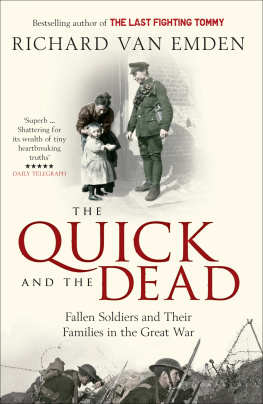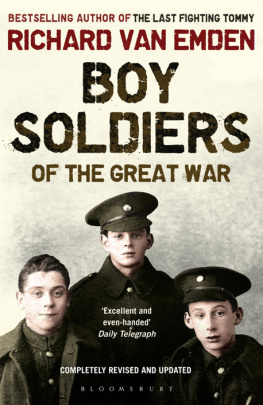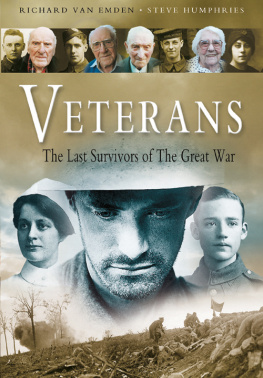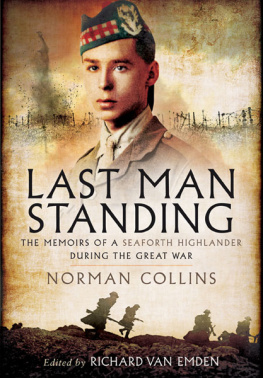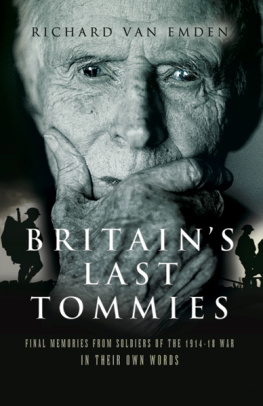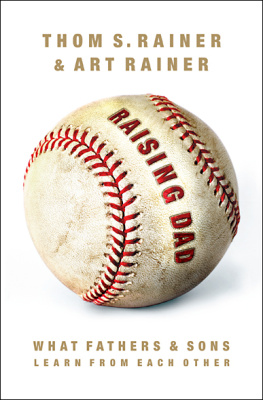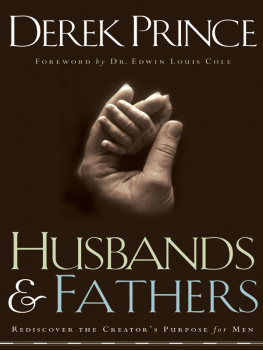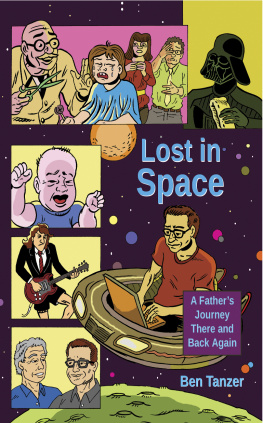The Quick and
the Dead
Fallen Soldiers and Their Families in the Great War
Richard van Emden

Dedicated to the memory of Joyce Crow, ne Sherington ( 1909 2008 ), and her brother, Private Robert Arthur Sherington, killed during the Battle of the Somme, October 1916 .
And to Leonard Sutton* of Hillside, Reading, who lost four of his five sons in the war: Lieutenant Eric Sutton MC, aged twenty-one , killed April 1916 ; Second Lieutenant William Sutton, aged twenty , killed November 1917 ; Second Lieutenant Alexander Sutton, aged nineteen , killed January 1918 ; Lieutenant Eustace Sutton, aged twenty-two , killed March 1918 .
And to Captain Leonard Noel Sutton, wounded 1918 .
* Leonard Sutton owned a large late-Victorian house called Hillside, and a company, Sutton Seeds, that still specialises in the packaging and selling of commercial seeds. Hillside, now one of Reading Universitys halls of residence, was within sight of the home in which I grew up. I walked past Hillside every day and noticed the wrought-iron railings and the tall brick entrance that still bears the name of the house.
I knew nothing of its history until last year when, by chance, I discovered that Leonard Sutton had owned the house where he lived with his wife, Mary, and their five sons and one daughter. Mary Sutton died in 1900 leaving Leonard, then thirty-six, to bring up six children under the age of ten. All five boys went on to serve in the Great War and four were killed.
After the war, Leonard Sutton became a Governor of the Royal Agricultural Society, vice-president of the Royal Berkshire Hospital, president of Reading Chamber of Commerce, and vice-president of the Royal Horticultural Society; he was also three times Mayor of Reading. Before his death in 1932, he was elected vice-chairman of the NSPCC. Perhaps his loss made him throw himself into his work. He certainly knew more than anyone ever should about cruelty, pain and suffering.
The dreaded word gas was sounded along the line. Instantly tin hats were flung off and gas-masks donned, a feat which was performed quicker than it takes to write, for we thoroughly believed in the oft-repeated maxim that in a gas attack there were but two kinds of men the quick and the dead.
Henry Russell, Slaves of the War Lords
Contents
Should you find yourself in Eastbourne with an hour or two to spare, you might care to visit the little Musgrave Museum in Seaside Road, a street that runs behind and parallel to the seafront parade of shops, restaurants and hotels. It contains the lifes work of George Musgrave, an independent and, as he describes himself, single-minded man. His museum is an eclectic collection of items, from coins to paintings, from newspapers to cameras, from pottery to wax models in truth there is no obvious link; it simply seems to offer items of cultural interest that George has collected from across the globe. The visitors book shows a steady trickle of interested and appreciative if occasionally bemused tourists who have looked around during the spring and summer months when the museum is open.
Just inside the front door of the museum is the link that binds everything together. It is a wooden, glass-fronted stand in which is a photograph of a soldier, the pencil drawing of a train, the picture of a little boy, and above them the words, The Dad I Never Knew . A brass plaque, known as a death penny, is also in the stand. Given by the government to bereaved families, it confirms that this particular soldier did not return from war.
The collection is Georges act of devotion to a lost father, mortally wounded in France in 1917 . Indeed, everything in the building has been brought together by this ninety-six-year-old man so as to leave a lasting memorial to a soldier now ninety-four years dead. And that small difference of two years is important. George has no memory of his father, but the train, drawn under fire in the trenches, was crucial in fusing forever the bond between them. To little George for his birthday from Daddy is the accompanying note. It is one thing for a mother to tell a son that his late father loved him, quite another to have tangible and irrefutable proof.
The Musgrave Museum lends credence to the idea that the Great Wars rippling influence remains with us today, and absorbing stories have continued to excite media interest for their mixture of tragedy, poignancy and simple curiosity. In December 1998 , the Guardian ran an article about the meeting, eighty years on, of a brother and sister separated by war. After their father was killed in November 1917 , Albert and Daisy Bance were placed in different childrens homes by their mother who herself died shortly afterwards. The siblings were reunited only after a long search by relatives who discovered Albert living in Canada, where he had been sent when he was fourteen. The two were brought together in an emotional meeting at Montreal airport. There were all these people standing there and there was Albert with a lovely bouquet of flowers. I just put my arms around him and started crying, Daisy is reported to have said. Aged eighty-five, she then returned to England where she died peacefully the following March.
That same month, in the Thames Estuary, fisherman Steve Gowan was hauling in his catch of cod and Dover sole when he saw an old ginger-beer bottle in the nets with what appeared to be a piece of paper inside. After prising off the rubber stopper, he found a message written by a soldier as he left for war in September 1914 : Dear wife, I am writing this note on this boat and dropping it into the sea just to see if it will reach you. If it does, sign this envelope on the right hand bottom corner where it says receipt. Put the date and hour of receipt and your name where it says signature and look after it well. The message ends, Ta ta, sweet, for the present. Your hubby. The writer asks the finder to kindly forward the enclosed letter and earn the blessing of a poor British soldier on his way to the front.
The soldier, Private Thomas Hughes of the Durham Light Infantry, was killed thirteen days later. Widowed with a two-year-old daughter, Elizabeth Hughes would later remarry and in 1919 emigrate from her home in Stockton-on-Tees to New Zealand. The Times printed the story when it was discovered that the daughter, Emily, was still alive and in May 1999 Steve took the letter to Auckland and handed it to the then eighty-six-year-old.
Thomas Hughes had sailed from Southampton so the bottle had bumped along the sea floor, carried along by the tides and currents for over a hundred miles to reach the Estuary, explained Steve. It had got to the stage where one edge was really thin and it would not have been long before it would have broken. Even then, it was lucky not to be smashed, for, as the fishing net opened, it was almost certainly cushioned by the catch tumbling to the deck.
Two years later, in 2001 , Emily made her one and only trip back to Britain to meet relatives she had never known and to give the bottle to the Durham Light Infantry Museum for safekeeping.
If the picture of the train made George Musgraves father come alive to him, the recovery of the bottle transformed Emilys feeling about her father. I was overwhelmed by the whole experience. All of a sudden my father was real to me rather than just my mothers memories.
More than , children lost their fathers during the Great War, and the vast majority have themselves since died. George Musgrave is one of a rapidly diminishing band, all now at least in their early nineties, who were left to forge their lives not only without the guiding influence of a father but all too frequently in the teeth of unremitting and abject poverty. After 1918 , the mood was to honour the dead but also to forget the war, to move on and be grateful to those whose noble sacrifice had guaranteed everyone elses life, liberty and freedom. Loss was so general, so communal, that survival was reward enough.
Next page
